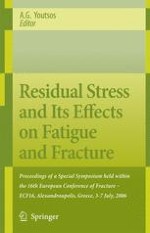2006 | OriginalPaper | Chapter
Evaluation Of Novel Post Weld Heat Treatment In Ferritic Steel Repair Welds Based On Neutron Diffraction
Authors : C. Ohms, D. Neov, A.G. Youtsos
Published in: Residual Stress and Its Effects on Fatigue and Fracture
Publisher: Springer Netherlands
Activate our intelligent search to find suitable subject content or patents.
Select sections of text to find matching patents with Artificial Intelligence. powered by
Select sections of text to find additional relevant content using AI-assisted search. powered by
The occurrence of cracks in – normally welded – components with safety relevance in, e.g. nuclear installations or in the (petro-)chemical industry, is not an unusual event. In most cases such cracking is detected in periodic inspections prior to complete failure of the component. Sometimes a detected defect necessitates repair of the damaged component to facilitate its further operation. Repairing of a crack would normally be performed by excavating of the material surrounding the crack and subsequent filling of the excavation by welding. However, such a repair welding process leaves the component in a sensitive state in that it generates a complicated residual stress pattern and that the heat affected zone of the weld might become very susceptible to the formation of new cracking [1]. Post weld heat treatment of a repaired component can be an option to mitigate the damaging impact of the welding process. Through heat treatments residual stresses can be severely reduced or redistributed to obtain stress fields around the weld deemed less detrimental. At the same time a heat treatment process could positively influence the HAZ sensitivity for further cracking. In any case, a thorough assessment of the welding process is necessary to ensure a safe continued operation of the repaired component.
In this context letterbox repair welds applied to thin ferritic steel plates to simulate repair of postulated shallow cracks have been manufactured. The excavations of postulated cracks for these experiments were filled with 20 to 30 welding passes. Components have been made available in the as welded state and after the application of PWHT. Two different heat treatment processes are compared: a. a full scale treatment, where the entire test piece has been subjected to an elevated temperature for several hours in order to significantly reduce the residual stresses, and b. an alternative treatment whereby the heat is applied locally for a short period of time in order to redistribute the stresses in a controlled manner.
In this paper the experimental determination of these residual stresses in the as welded and in the heat-treated states is presented. Such measurements have been performed by neutron diffraction at the High Flux Reactor (HFR) of the Joint Research Centre of the European Commission in Petten, the Netherlands.
The principle of residual stress measurements by neutron diffraction is introduced [2] and the particular considerations for performing such measurements in multi-pass butt welds are briefly outlined [3]. The experimental approach is presented and explained and an outline is given on the data analyses. Results are depicted in the form of comparison between the as received and the heat treated stress states. The derived data facilitate conclusions on the effects and effectiveness of the applied heat treatments and they also demonstrate that neutron diffraction is a very suitable tool for non-destructive analysis of internal residual stress fields in such welded components of considerable thickness. In addition, the method is well suited for the validation of predictive numerical models.
